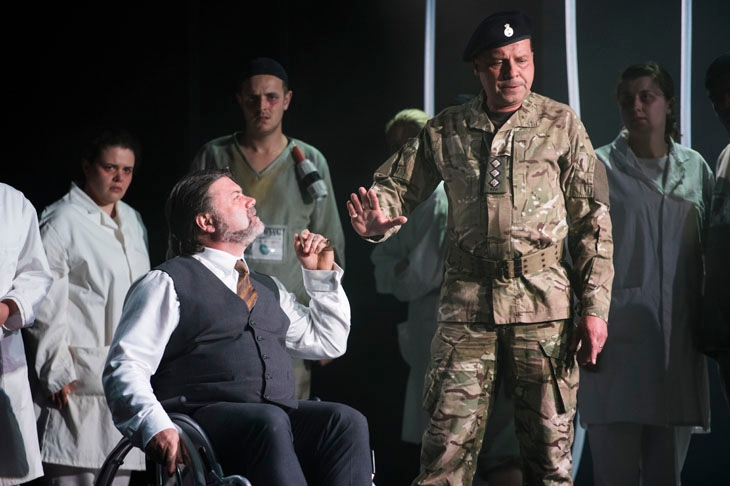If you want to see an opera director kicking a genius when they’re down — and I mean really sticking the knife in and giving it a good old twist around — Fidelio is usually a safe bet. It’s one of Beethoven’s few undisputed masterpieces in which he’s not in absolute command of his medium; instead, the sheer moral and emotional conviction of the music carries it through. Confronted with such blazing sincerity, the instinct (possibly defensive) of many modern directors seems to be to subvert, to undercut, to belittle. I haven’t seen a production of Fidelio this century that’s been content simply to help the work speak (and Fidelio does need some discreet help). It’s become normal to emerge from this most uplifting of operas feeling confused — even angry.
By that measure, the fact that Orpha Phelan’s new production at Longborough is merely frustrating counts as something of a success. Indeed, if Fidelio were a more conventional opera, it’d probably have worked rather well. We’re in the dehumanised future of sci-fi thrillers like Prometheus, all gloom, dully blinking lights and pulsing umbilical pipes and cables. Pizarro brandishes a hypodermic syringe and the prisoners are hooked up to a sinister machine. The designer Madeleine Boyd says that she wanted to create a ‘sense of imminent death’, and it’s as oppressive as Beethoven could have wished. Dressing the cast in utilitarian overalls also makes Leonore’s gender-swapping disguise plausible.
She’s sung by Elizabeth Atherton with a fierce, concentrated integrity and a voice whose matte finish matches the production — starting to burn with tremulous warmth only after her final reunion with Florestan (Adrian Dwyer), which the pair act out with raw and wholly convincing emotion. This isn’t the most glamorous-sounding cast, though nothing in their singing contradicts the drama. John Paul Huckle, as Rocco, fills out the character both vocally and dramatically; Lucy Hall’s Marzelline is endearingly fresh, and Timothy Dawkins, as Don Fernando, has the sonorous nobility that the story, and Beethoven’s increasingly exalted music, demands at that point. And as Pizarro, Simon Thorpe sings with a guttural force and a menacing, hollowed-out paleness that’s all the more impressive for being delivered from a wheelchair.
Phelan, you see, has given Pizarro a back-story (mimed during the overture) in which he’s been shot and paralysed by Florestan. In the final scene — as everyone present sings of love and celebration, with sunlight streaming from the chorus and orchestra under Gad Kadosh — he’s brutally executed. Against that decision, Phelan’s other misjudgments — notably the decision to have the opera sung in German while the spoken dialogue is delivered in a toe-curling updated translation (‘It’s good to go’; ‘Why the long face?’) — hardly matter. Find nuance, by all means, in Pizarro; find shadow, if you like, in Leonore. But to give moral equivalence to the characters of this of all operas, while the music insists otherwise, throws head and heart right out of alignment. Phelan is a compelling director, whose recent Billy Budd at Opera North was overwhelming. And one of the many glories of Longborough is that they hire risk-takers and then back them whether they succeed or fail. In this case — as Rory Sutherland might put it elsewhere in these pages — Phelan has come up with powerful answers to entirely the wrong questions.
As for Otello at the Royal Opera: well, yes, to the surprise of the opera buffs who ran sweepstakes on when (not if) he’d cancel, Jonas Kaufmann did actually show up, and threw every colour in his extraordinary vocal palette at the title role. Snarling, soaring, letting the blood drain murderously from that glorious voice, or pinning Desdemona (Maria Agresta) against the wall with brazen shafts of tone: my overall reaction was that it was all mightily impressive, without at any point (barring a few sparks during his Act Three confrontation with Desdemona) persuading me that we were seeing the character rather than the artist. Is the Jonas now too big a star to embody anything but himself? Certainly, Marco Vratogna’s bullish, black-toned Iago felt intensely believable, as did Agresta — at least in her heartbreakingly fragile final scenes.
If it didn’t quite hang together, Keith Warner’s direction might be to blame — a lot of clasping of hands to chests and writhing on the floor amid sliding monochrome sets and static choral scenes. The Venetian ambassador was dressed as Liberace, and Desdemona expired on tastefully co-ordinated bedlinen (I think it was from John Lewis). Meanwhile, in the pit, Antonio Pappano conducted Verdi’s score with a sweeping, gleaming fervour in which every thud of the bass drum was charged with ominous meaning. Magnificent, but it wasn’t enough. Taken as a whole this felt like disappointingly less than the sum of its parts, on the first night at least. Your experience may differ.






Comments